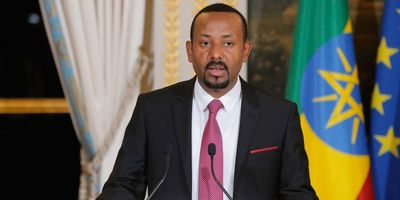Ethiopia Declares State of Emergency Amid Rising Regional Attacks
Ethiopian Prime Minister Abiy Ahmed has declared a state of emergency following rising Tigrayan attacks on national military troops.
Photo credit MICHEL EULER/AFP via Getty Images
Ethiopian Prime Minister Abiy Ahmedhas declared a state of emergency. This follows alleged rising attacks from the northern region of Tigray. According to The Washington Post, the Ethiopian government alleges that the Tigray People's Liberation Front (TPLF) provoked the government into military confrontation. This after TPLF was accused of attempting to steal artillery and other military equipment during an alleged attack earlier in the week.
According to Al Jazeera, Ethiopia's Federal Federal Council of Ministers made the declaration on Wednesday. The declaration stated that the activities of the TPLF were "illegal and violent activities within the National Regional State of Tigray" and "endangering the constitution and constitutional order". Military envoys have been dispatched to Tigray in what the Ethiopian government calls the last line of measure.
Conflicts with Tigray reportedly started in 2018 when Ahmed was voted into power. TPLF slowly started losing power over the region and then conflicts erupted. Earlier in the year, the region decided to commence elections despite government's cessation according to COVID-19 regulations. The Ethiopian government did not recognise the elections and rendered them illegal. Tensions have been growing steadily ever since. Last week Tigray blocked a general appointed by Ahmed's government and stopped him from assuming his military post, saying the Ethiopian prime minister no longer had the authority to make such moves. The prime minister is reported to have issued an internet shut down in the region. Ahmed is known for issuing internet shutdowns during political unrest.
Read: Bobi Wine Arrested After Being Certified as Presidential Candidate
Fears of an internal war have been rising since September this year. Tigray senior official, Wondimu Asamnew, commented on the tensions to Al Jazeera:
"A small spark can ignite the whole region. So I think we are on the alert and I can assure you we are capable of defending ourselves."
Ethnicity is a complicated factor in Ethiopian politics. Ethiopia has a population over 100 million with over 100 ethnicities. Oromo people form the largest of the groups of the population. The TPLF was the dominant force in the Ethiopian People's Revolutionary Democratic Front (EPRDF), a multiethnic, four-party coalition that had run the country for almost 30 years before Ahmed was voted into power in 2018 amidst nationwide anti-government protests. Ahmed created the pan-Ethiopian Prosperity Party (PP) which replaced the Ethiopian Peoples' Revolutionary Democratic Front (EPRD). A year after his election as Prime Minister, he won the Nobel Peace Prize in 2019 for bridging the ethnic divide in Ethiopia.
Tigray makes up six percent of the total population. Conversely Tigray reportedly makes up more than half of Ethiopia's total military force which is of much concern to the government.
- How The Oromo Protests Are Exposing Ethiopia's Longstanding ... ›
- The Army Has Been Deployed to Ethiopia's Oromia Region Amid ... ›
- Hundreds of Ethiopians are Protesting Against Prime Minister Abiy ... ›
- Prime Minister Abiy Ahmed Ends Internet Shutdown in Ethiopia ... ›
- Ethiopian Prime Minister Abiy Ahmed Wins Nobel Peace Prize ... ›
- Ethiopia's Abiy Ahmed Responds to Trump's Claims of Nobel Peace ... ›
- Ethiopia's Prime Minister Abiy Ahmed has Been Awarded the Nobel ... ›
- Ethiopia's #BringBackOurStudents Takes to the Streets - OkayAfrica ›
- Ethiopian Prime Minister Gives Tigray 72 Hours to Surrender Amidst Rising Attacks - OkayAfrica ›
- Ethiopian Prime Minister Abiy Ahmed Sworn in For 5 More Years - OkayAfrica ›
